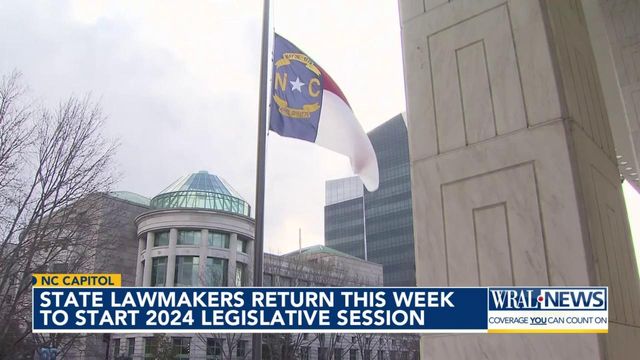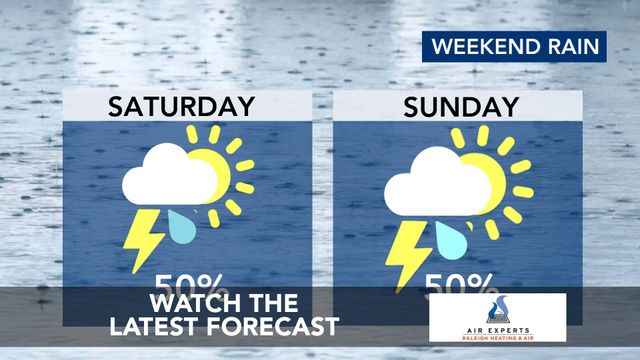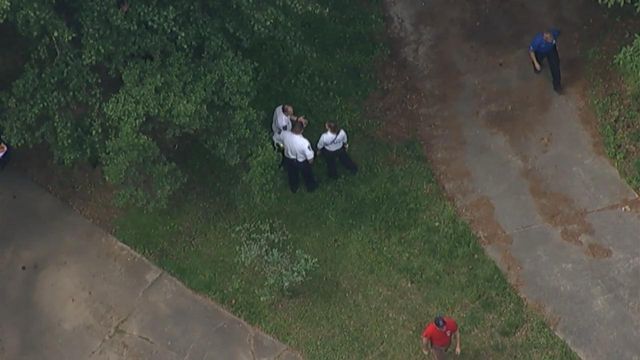With $1 billion budget surplus, NC lawmakers return to Raleigh for 2024 session
State lawmakers start their 2024 legislative session Wednesday with a primary goal of making tweaks to the state’s $30 billion annual budget. But much more, from immigration to medical marijuana, could be on the agenda.
The budget lawmakers passed last year contained raises for teachers and other state workers — 7% spread over two years, which was lower than advocacy groups had pushed for. They’ll be looking for an extra boost in the second year of the budget plan, which begins in July.
However, those efforts will run into competition from other recipients of state funding. Republican leaders have said the state’s Medicaid division as well as a private school tuition voucher program could both use hundreds of millions of dollars more. And several groups plan to push for additional funding for child care programs to replace hundreds of millions of dollars in federal child-care funding that’s ending in June. The North Carolina Chamber of Commerce, a powerful pro-business lobbying group, considers child care issues a top legislative priority.
But lawmakers will have some extra money to spread around. The Office of State Budget and Management released a report Wednesday indicating the state will have a more-than $1 billion surplus for the 2024-25 budget — with revenue of $34.4 billion, instead of the $33.4 billion they had originally planned for.
Not just the budget
Legislative sessions in North Carolina work in two-year cycles in which the majority of the work gets done in the odd-numbered years. That allows the even-numbered years, when all lawmakers are up for election, to remain focused less on policy and more on campaigning.
But there’s still likely to be some policy work tackled in the short session this spring — particularly in areas that overlap with what politicians want to be talking about on the campaign trail.
Immigration will likely be a top issue for the Republican-led legislature. Education policy could likewise be an area of focus again; for years it has been the focus of culture-war debates over the extent to which schools should address topics such as racism or LGBTQ rights. Lawmakers are also expected to discuss potential tweaks to the sports-betting law that passed last year and went into effect last month.
Democrats plan to use the session to bring attention to issues they’d address if they had more power. Every state legislative seat is up for election in November, and Republicans currently hold veto-proof supermajorities by just a single seat in both chambers of the General Assembly.
Here are some issues that could come up:
Immigration. A conservative push to force sheriffs to cooperate with federal immigration officials, despite the constitutional concerns that some sheriffs have raised, passed the House mostly along party lines last year. But the Senate never brought it up for a vote, instead saving it for this year. State and national Republicans are hoping to make immigration a key theme of the 2024 elections, so passing the bill could help them show action to constituents.
Guns. State Rep. Marcia Morey, a Durham Democrat, plans to kick off the new session with a press conference Thursday calling for new firearms safety laws. A WRAL News poll last month found most North Carolinians would favor legislation to address gun violence, although similar efforts in the past have gone nowhere in the GOP-controlled legislature. One gun bill that has a greater chance at receiving attention — yet is still considered a long shot — is a proposal from Republican Rep. Keith Kidwell to get rid of concealed carry permit requirements, and let state lawmakers bring guns into the legislature.
Child Care. North Carolina has typically received about $400 million per year in federal subsidies for child care, a number that ballooned to $1.3 billion during the pandemic. But Congress cut off the extra pandemic-era funding, and the money is now coming to an end. There are fears of child care centers closing their doors if the state doesn’t match some or all of that funding, which could in turn force some parents to quit their jobs or reduce their hours if they can’t find other child care options. Already, many parents find themselves waitlisted for months when trying to enroll kids in daycare and the Chamber of Commerce is worried about child care becoming even less available in the future: “We will work to remove barriers to employment, including identifying and advancing child care policy reforms and innovations that address the growing workforce demands from the business community,” a Chamber spokeswoman said.
Homeowner associations. Last year the House passed a bill to significantly crack down on the power of homeowners associations to take people’s homes over minor issues like an unpaid $20 fine, among other topics. But the HOA industry successfully lobbied the Senate to water down the bill, and it ended in a stalemate with neither chamber agreeing to pass the other’s proposal. A bipartisan group has met regularly during the past several months to work on finding a middle-ground solution. The issue is expected to come back up again this session.
Medical marijuana. Most states have already legalized medical marijuana. Bringing it to North Carolina is a priority for Sen. Bill Rabon, R-Brunswick, a powerful state senator and cancer survivor who has spoken of his own marijuana use years ago during chemotherapy. Rabon says his bill would give North Carolina the strictest medical marijuana rules anywhere in the country if it becomes law. It passed the Senate with broad bipartisan support in 2022 and again in 2023. Each time it stalled in the House of Representatives, without being allowed a vote, but it is eligible for a House vote again this year. A WRAL News poll in 2022 found 57% of North Carolinians would support fully legalizing marijuana for any adult, and 72% would support medical marijuana.
Help for bars. State lawmakers will likely look to roll back parts of a new bill regarding food safety inspections at bars, WRAL’s 5 On Your Side reported in February. Bar owners from around the state have complained the new rules are overly burdensome and expensive for them to comply with.
Gambling: The legislature will look to address video lottery terminals, or VLTs, House Speaker Tim Moore told reporters this month. Video gambling has been outlawed in North Carolina for decades, but a succession of legal battles and resulting changes in gaming software has kept the doors open at video gambling parlors all over the state. People associated with the industry have donated large sums of money to state lawmakers as they seek legalization. The state recently legalized sports betting, a topic that could continue seeing tweaks this year, potentially over horse racing. Morey, the Democratic Durham representative, also told WRAL she plans to introduce a bill banning prop bets, largely in line with a recent suggestion from the NCAA to disallow prop betting on individual college athletes. Morey is a former college and Olympic swimmer. But some of the legislature’s powerful, pro-sports-betting GOP leaders have previously said they would protect prop betting.
‘Gas station heroin’: Lawmakers are pushing to outlaw tianeptine, which critics call “gas station heroin” since it can be bought at many convenience stores. Some Republican state lawmakers say it’s dangerous and highly addictive, despite being openly for sale to people of all ages in North Carolina. They want to pass a law this year banning it. It’s not regulated or approved for medical use in the U.S., but in other countries it’s used as an antidepressant.
Education. In addition to boosting funding for private school tuition vouchers, the legislature could also take new action on public education policy. The UNC System Board of Governors plans to vote next month on a new policy targeting diversity and inclusion efforts at state universities and eliminate positions related to diversity and inclusion. The legislature could pass a law doing the same to make the policy more permanent. Lawmakers debated multiple anti-DEI laws in 2023 and passed one into law, banning state agencies and universities from asking potential or current employees to affirm their support for diversity. At the K-12 level, lawmakers briefly considered a bill last year that would have banned certain books from all public school libraries, banned students from being allowed to check out any library books without parental permission, and given more power for selecting books over to outside groups. It also would have given parents more power to sue school districts to try getting a superintendent fired. The bill was pulled last year, with Moore saying GOP lawmakers wanted to discuss it privately before deciding whether to move forward with it in a future session.
Changes to election laws: State elections director Karen Brinson Bell testified at the legislature for over two hours last week, in part warning lawmakers that the elections this year are at risk from a number of issues — from artificial intelligence being used to spread misinformation, to a massive amount of turnover among county-level election staff in the past few years. She’s pushing for more funding to increase staffing ahead of the November election. Beyond those budgetary talks lawmakers could discuss action to address AI in elections, although there appears to be little appetite for such regulation, WRAL reported last month. And with numerous election-related lawsuits moving through the courts on issues including voter identification, felon voting rights and same-day registration, it’s also possible the legislature could tweak some of those laws depending on what happens in court.











